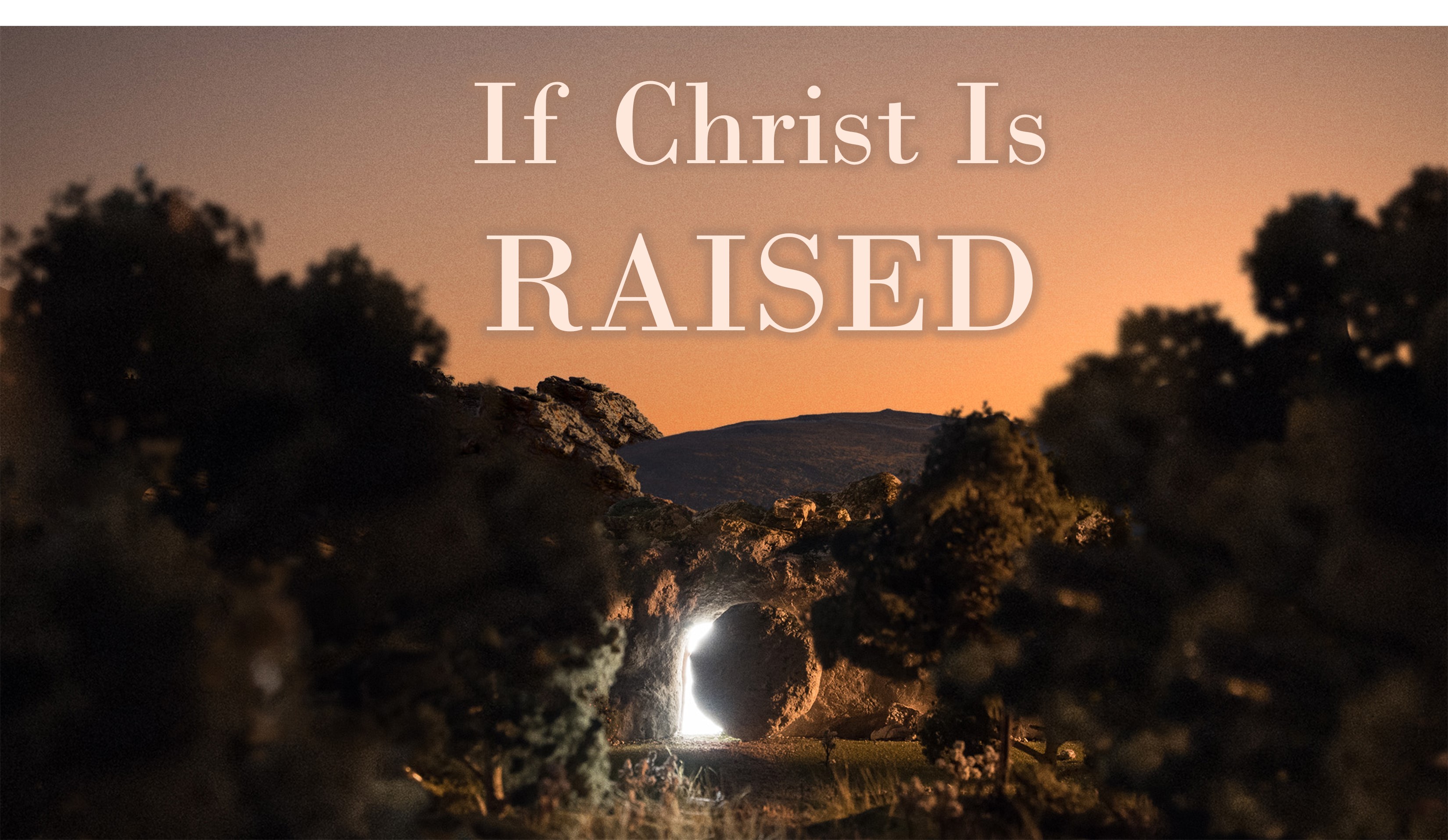Blog
If Christ Is Raised
Wednesday, March 02, 2022
In our preaching and teaching this quarter, we are focusing on devotion to the apostles’ teaching. Last week, Clay observed—and correctly so—that the essence of the apostles’ teaching is that Jesus was raised from the dead. Through the early part of Acts, it seems like Peter and the rest can’t hardly get two words out of their mouths without referring to the resurrection in some way.
The apostles didn’t spend so much time on it because the resurrection was fun to talk about. Instead, it is nothing less than the most significant event in human history. It’s significant for the way we live. As Clay pointed out, we disciples live a resurrected life that is dramatically different from the life of the worldly.
However, the implications don’t stop there. The resurrection doesn’t only change our attitudes and behavior. It transforms the way we understand reality. Everything about human existence is different because of the resurrection. I know this is a huge claim, but the Scriptures bear it out. This morning, then, let’s consider only some of the implications if Christ is raised.
The first of these is that HE IS A TRUE PROPHET. Consider the test of Deuteronomy 18:18-22. Though this test is inspired, we could arrive at the same conclusion using common sense. We can know that a man speaks for God if he correctly predicts the future.
After all, we can’t do that. Weather forecasters with advanced degrees and massively complicated computer models can’t even tell us if it’s going to rain next Thursday! If somebody does correctly predict the future, especially in a specific and unlikely way, it validates his claim to be God’s prophet.
Jesus did exactly that when He predicted His own death, burial, and resurrection. We’ve talked about how prevalent the resurrection is in Acts. The funny thing is that it’s nearly as prevalent in the gospels. Jesus is constantly telling people that He is going to rise from the dead, directly, by implication, and by metaphor. Even His enemies knew that His own resurrection was a big part of His teaching.
In rising from the dead, Jesus confirms His own predictions, passes the Deuteronomy 18 test, and proves Himself to be a true prophet. Thus, the rest of Deuteronomy 18 applies. We must accept that Jesus speaks for God, and we also must hear God’s warning that He will hold accountable everyone who does not listen to Jesus.
This has immense significance for the way we read the gospels. The God who raised Jesus from the dead surely also would safeguard the words of His prophet, so we can be confident that the gospel accounts of Jesus’ teaching correctly represent that teaching. If Jesus said it, we are right to believe it, and we must obey it.
This has many implications, but one of the most important is that JUDGMENT, HEAVEN, AND HELL ARE REAL. We see this in many places in Jesus’ teaching, but Matthew 25:31-46 brings all three together. We don’t have time to delve into the subtleties of this passage, but its broad outlines are simple and clear. The day will come when Jesus will judge the nations according to their works. This judgment will vindicate the righteous, and He will invite them into eternal life. However, it will condemn the wicked, and He will send them away into eternal punishment. Because of the resurrection, we know that we can trust what Jesus says about the afterlife.
Brethren, this conviction transforms my life right now. Because I know that my time on earth is comparatively short, I naturally spend a lot of time thinking about what will happen next. Are the atheists right, and I am about to be as permanently dead as my grandfather’s dog? Is some other religion right, and I should have been giving my allegiance to Mohammed, Krishna, or some other mystical figure? Or, instead, can I continue to rely on the Lord I have served all my life?
The resurrection answers these questions for me. Because Jesus rose, I can know that what He has said will happen, will happen. Thus, even though I am dying, I can and must continue to live with purpose. I inevitably will stand before the throne of God and give an account, so I’d better get ready for it! Similarly, the most important thing I can do with my time is help others get ready to give their account. I can’t give up now because the resurrection fills every day I have left with profound meaning.
Finally, if Jesus rose, LIFE IS ONLY POSSIBLE THROUGH HIM. Consider His words in John 14:1-6. This passage reaffirms what we saw in Matthew 25. Currently, Jesus is preparing an eternal home for the righteous, where they will dwell eternally with God.
So far, so comforting, but Jesus’ next words are shocking. Indeed, billions of people would find them infuriating and offensive. The only way into eternal life is Jesus. Apart from Him, no one is going to reach that heavenly dwelling place with God. All those other holy figures are liars and frauds. They have nothing to offer us. Similarly, atheists are murderers. Everyone who listens to them will pass into eternal death instead.
Among other things, Jesus’ words here are an affront to our society that prizes tolerance above all else. No, you can’t be transgender and hope to inherit eternal life. Jesus says that God created them male and female. No, you can’t get unscripturally divorced, remarry, and pretend that you’re righteous. Jesus says that’s adultery. No, you can’t call Jesus “Lord”, refuse to obey Him, and act like it’ll be good enough. Jesus will tell you that He never knew you. He is the way, the truth, and the life, and there is no other.
In short, Jesus’ words allow no room for compromise. Either you are with Jesus in everything, or you are against Him and on the fast track to eternal disaster. This is a hard saying indeed! We don’t like people who say to us “My way or the highway,” but Jesus is the ultimate in my-way-or-the-highway. However, this ideologue, this tyrant who wants to control every aspect of our lives, is also the One who rose from the dead. We obey Him because of the resurrection. We have no other choice.
Peter's Succession Plan
Tuesday, March 01, 2022.jpg)
The claims of the Catholic Church to spiritual authority depend on two doctrines. The first is apostolic succession, which argues that bishops are the successors to the authority of the apostles. The second is Petrine succession, which views the popes as the authoritative successors of Peter. If both apostolic and Petrine succession are valid, the Catholic Church is indeed the one true church.
Not surprisingly, the oral traditions of the Catholic Church confirm both doctrines. However, from a cynical perspective, this looks an awful lot like, “You have to listen to me because I said so!” Only those who already have accepted the spiritual leadership of Rome will find these arguments persuasive.
What of the Scriptures? Unlike oral tradition 2000 years old, all Christians acknowledge their authority. The New Testament is filled with the words and writings of the apostles in general and of Peter in particular. If indeed the various succession doctrines were intended to be the bedrock of the Church until the end of time, we would expect first-century speakers and writers to have a lot to say about it.
This isn’t the case. Catholic apologists point to 2 Timothy 2:2 as evidence for apostolic succession, but it reads to me like a command to teach rather than a grant of authority. Besides, who says Timothy was a bishop anyway? At the time of the writing of 1 and 2 Timothy, he was still a young man, unlikely to be qualified by first-century standards.
Things are even hazier when it comes to Petrine succession. No less an authority than Joseph Ratzinger (the former Pope Benedict XVI) concedes in the tract “Peter and Succession”, “There is no explicit statement regarding the Petrine succession in the New Testament.” If we want justification for Petrine succession, we must needs look outside the word.
Nor is that all. Peter may not have mentioned handing off his authority to Pope Linus or anybody else, but he did explicitly set out his plans for ensuring that Christians would be taught after his death. They appear in 2 Peter 1:13-15. He says, “I think it is right, as long as I am in this bodily tent, to wake you up with a reminder, since I know that I will soon lay aside my tent, as our Lord Jesus Christ has indeed made clear to me. And I will also make every effort so that you are able to recall these things at any time after my departure.”
Basically, 2 Peter was Peter’s succession plan. He, along with the other apostles and prophets, ensured that his inspired teaching would be carried forward by writing it down. Today, 2000 years later, we still can “recall these things” by reading what they wrote.
This doesn’t help the Catholic Church much, but it helps us tremendously. We don’t have to rely on somebody who claims to have secret knowledge in order to figure out what God wants us to do. Instead, we only have to open the Book. Peter and the other writers will tell us all we need to know. It’s up to us to obey it.
A First-Century Memory Verse
Friday, February 25, 2022
One of the interesting features of modern translations is the formatting they use for the text. The King James Bibles of 100 years ago set every portion of Scripture in verse-by-verse mini-paragraphs. By contrast, more recent translations often employ poetic formatting, even in cases where most of the book is prose.
We find an example of this practice in 2 Timothy 2:11-13. When we see this, our antennae should go up because the translators are telling us that something different is happening. In this case, I think the translators are right. This three-verse chunk uses a rigid parallel structure, which makes it extremely easy to memorize.
My guess is that this snippet is not original to 2 Timothy. Instead, I think it is an example of Christian oral teaching that predates the New Testament. Early converts were taught this so they could carry around the essentials of the faith even though they didn’t have Bibles.
Today, this is valuable to us for the same reason. We may have Bibles in our pockets everywhere we go nowadays, but more important still is the word in our hearts. This passage still is easy to memorize, and it offers four priceless spiritual reminders. Tonight, then, let’s examine this first-century memory verse.
All four of these statements are in if-then form, and the first begins with “IF WE DIED WITH HIM”. The best Biblical explanation of this appears in Romans 6:3-5. There are other passages that talk about dying daily with Jesus, but 2 Timothy 2:11 refers to an event from the past. The only death-and-life event like that in Scripture is baptism.
Notice, in fact, that Paul says that baptism is a death that leads to two different kinds of life. The first is rising from the burial of baptism to walk in newness of life. Romans 6:5, though, is talking about something different. We already have been raised to walk in newness of life, but we will be raised in the likeness of His resurrection.
Thus, even though it never uses the word, 2 Timothy 2:11 affirms the necessity of baptism. Unless we have died with Christ, we will not live with Christ. Apart from baptism, we cannot enter eternal life.
If you find yourself talking to someone who doesn’t believe that baptism is essential to salvation, ask them when they died with Christ. The sinner’s prayer isn’t a death. Neither is infant baptism. Only the baptism of the Bible, the burial in water of the believer, makes the metaphor work.
Our second if is “IF WE ENDURE”. We get a deeper appreciation of what this means from James 1:12. James makes explicit an element that is implied in 2 Timothy—the endurance under discussion is endurance through trial. This doesn’t mean merely that we keep showing up for services for 50 years. It means that we remain faithful even when faithfulness is difficult.
In the first century, this particularly was about persecution, but for us today, this can be anything that humbles us, anytime when life isn’t going our way. We’re suffering like the folks on the bottom instead of riding high like the folks on the top. However, if we keep going, our circumstances will be profoundly reversed. We will receive the crown of life, and we will spend eternity living like kings with Jesus.
When I read this passage, I can’t help but be reminded of the hymnal Sacred Selections. The editor of Sacred Selections, Ellis Crum, was death on premillennialism. In his hymnal, he deleted every reference to reigning with Jesus because he thought it was premillennial. However, as we see, the concept of reigning with Jesus is explicitly Scriptural, and it gives us hope in the darkest moments of our lives.
With our third if-then, we move from positive to negative with “IF WE DENY HIM”. Here, of course, we must go to Matthew 10:32-33. Sometimes, we use this passage to affirm the importance of confessing Christ as Lord as part of our initial salvation, but that’s not really what it’s about. Jesus here isn’t talking about acknowledging that He is the Messiah before a friendly audience. He’s talking about claiming Him as Lord before an audience that isn’t.
Again, this particularly is about reacting to persecution. It was hard to make the good confession when imprisonment or death would result! However, Paul offers a stern warning. Those who deny Christ will be denied by Christ.
In fact, this was a burning issue in the second and third centuries. What happened to Christians who denied Jesus to the Roman authorities and later repented? Because of this verse, many argued that they could not be received back into fellowship and were doomed no matter what they did.
Today, we usually aren’t threatened with persecution, but there are times when we are tempted not to acknowledge Christ because of social awkwardness. However, we must remember that our salvation depends on our willingness to lift up our Lord. Only if we will share in His shame will we share in His glory.
Finally, this statement explores the consequences “IF WE ARE FAITHLESS”. This statement reminds me of the warning in Hebrews 12:25. In both of these verses, notice the “we”. In 2 Timothy, the “we” has died with Christ. In Hebrews 12, the “we” has come to Mount Zion, the city of the living God, and all the blessings it contains.
This warning is not for outsiders nor for sham Christians. It is for those who genuinely have been saved and just as genuinely can fall away. In the face of such faithlessness, God will be faithful, just as He was faithful in the time of the Old Testament. He set before His people life and death, blessing and cursing. When they rejected Him, they received death and cursing, just as He had warned them they would.
This has two applications. The first is for our discussions with those who believe in eternal security, otherwise known as once-saved-always-saved. It is entirely possible for Christians to be faithless, and as soon as we deny that, we open the door for the devil.
Second, we must acknowledge its application to us. Every one of us, no matter how wise or mature, still can fall away. Bit by bit, we can drift from serving the Lord to serving ourselves, and the consequences of doing so are disastrous! Always, we must resolve to be faithful and cling ever more closely to Him.
The Dispensable Man
Thursday, February 24, 2022
There is no surer sign of being a control freak than wanting to control things postmortem. I qualify. Though some of my anxiety is directed at the prospect of dying slow and ugly, most of it is aimed at what will happen after I’m gone.
What will happen to my family? What will happen to my congregation and all the other people I love? What will happen to the song worship of the church? In short, surely without indispensable me, all of the above will fall apart!
There’s a sense in which the above concerns are godly. We are supposed to love people and care about their welfare. We are supposed to be devoted to the things of God.
However, there’s also a sense in which they are not. They reveal that on some level, I have made the Lord’s work about me instead of Him. He’s indispensable. I’m not.
Mordecai’s warning to Esther in Esther 4:13-14 beautifully illustrates this principle. He informs her that if her courage fails and she refuses to approach the king on behalf of the Jews, deliverance will arise from someplace else, but she and her family will perish. God’s people were going to be saved no matter what. The only question was whether Esther would be involved in their salvation.
This seems counter-intuitive to us. Who could be as well placed to rescue the Jews from a Persian noble as the queen of Persia? However, even if Esther may have been Plan A, God’s Plans B, C, D, and so on would have been equally effective in accomplishing His will. Haman was not going to frustrate His eternal purpose, even if He had to squash him with an anvil from heaven!
I am not essential to any of God’s purposes either, especially if He allows my early exit. There are works that He has given me to do, and I have striven to perform them faithfully. However, the work will go on without me, and His desires will be accomplished 20 years from now as they were 2500 years ago.
This realization is important for two reasons, one negative, one positive. The first is that self-centered anxiety opens the door for fear. If I try to control the future from the present, Satan will use my fear to corrupt and taint everything I do. When we live by fear instead of faith and love, the usual result is that we bring about the thing we’re afraid of.
The second is even more important. God remains in control, so the good I want to do will be done without me. I won’t be able anymore to lead my children to God, but others will be. I won’t be preaching any more sermons for Jackson Heights, but other men of God will take the pulpit and carry forward the work. I won’t write any more hymns, but other brothers and sisters will give the church what it needs to worship. I find this thought deeply reassuring!
Ultimately, my decisions are the same as Esther’s. They aren’t about others. They’re about me. They will answer the lonely question of whether I will live with faith and courage or fall to fear and failure. If the former, I need only set my hand to the work before me as long as I am able. God will take care of the rest.
Vessels for Honor
Wednesday, February 23, 2022
Every Christian should aspire to be useful to the Lord. It’s the only decent response available to those who have been rescued from so great a death by so great a salvation. None of us ever will be able to repay Jesus for what He has done for us, but we at least should do something!
This is a priority God shares. The great promise of salvation by grace through faith in Ephesians 2:8-9 concludes with the observation in v. 10 that we have been created in Christ Jesus for good works. When Jesus is confronted with the lukewarm Laodiceans in Revelation 3, He is revolted by them. The do-nothing disciple has fallen prey to a soul-destroying delusion.
We should yearn to be useful, and God expects us to be useful regardless. However, not all Christians are equally valuable in the kingdom. This is not determined by the gifts God gives us. Instead, Paul tells us in 2 Timothy 2:21 that we make ourselves useful by purifying ourselves from dishonorable things. Christians who do this are the fancy dishes you bring out for important guests; Christians who don’t do this are the chamber pots you hide away in the commode.
Next, Paul describes the dishonorable behavior Timothy must reject, the youthful lusts that carry away so many young people. However, merely keeping ourselves from sin is not enough, nor is merely avoiding the company of the wicked. Rather, we actively pursue righteousness with righteous people.
Interestingly, though, Paul does not consider an immoral life to be the greatest threat to the disciple’s usefulness. He devotes one verse (in our Bibles) to lust and four verses to contentiousness. The latter apparently is a much more significant problem.
This tracks with my own experience. Usually, the chamber-pot disciples I see haven’t been overwhelmed by worldliness. Those folks are long gone. Instead, the dishonorable vessels in the house of God are the Christians who can’t get along with others.
What do you do with people like that? You can’t give them a Bible class to teach because they’ll cause trouble in the church. You can’t send them out to reach the lost because they’ll alienate every outsider they talk to. Instead, into the commode they go, and you hope they won’t give you too much grief from in there!
Basically, if we don’t know how to treat others graciously, there’s not much that God can do with us. Thankfully, Paul tells us how to be gracious. Don’t fight over dumb stuff. Be gentle with everybody. Especially, be gentle with the people who disagree with you. Don’t try to run them over. Try to persuade them instead, and leave the work of conversion to the word of God in their hearts.
This is a spiritual challenge I understand well. I had 2 Timothy 2:24-25 taped to my bathroom mirror for many years, and I still struggle with the problem today. I know how easy it is to lose sight of others in the glare of my own certainty. However, only as we share Jesus’ meekness toward them can we be useful in His work.


